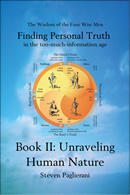The "No Parroting Allowed" Project (2005 - 2007)
Nothing kills a student's desire to learn more than having to parrot answers. So in 2006, we decided to explore the role curiosity plays in education. To do this, each week for more than a year, the members of the Emergence Teacher's Group composed a series of questions which we were not allowed to answer with answers. Rather, we first had to let these questions bake in our minds. Then we had to respond to them by asking more questions. Not surprisingly, the longer we thought about the questions, the more we felt the desire to learn. Also, it seems that having to come up with questions about questions deepens this desire.
Fast forward six years to 2013. This is the year we realized that making things selectively visual is the key to learning. In effect, by restricting what the student can see, the student becomes curious. This has led us to a series of rather interesting realizations about the nature of teaching and learning.
- One—all learning starts in the heart.
- Two—only the prepared mind is open to learning.
- Three—curiosity is what prepares the mind to learn.
- Four—you cannot make yourself curious. You can only learn to notice what you are not curious.
- Five—you are not curious when you believe you already understand what are hearing, seeing, thinking, or feeling.
Know that realization number five is the most important tool a teacher could ever learn. Ironically, if you believe you already understand this tool, then you're preventing yourself from having any ahas about what I just said. Conversely, the more you let this statement provoke questions in you, the more you open your mind to having your own realizations.
The point? Questions are the manifestation of a curious mind. Thus if you let what you hear, see, think, and feel provoke unanswered questions in you—and if you learn to let these questions result in more questions rather than in answers—you'll exponentially expand your ability to teach and learn.
Week 1: On Creating a Conscious Classroom
Week 2: Consciously Martial Arts
Week 3: Body Consciousness and Its Effect on Posture
Week 4: Acclimating Babies to Water
Week 5: What Makes Something Art?
Week 6: Ergonomic Consciousness for Desk Bound Writers
Week 7: Audiometric Consciousness for Listeners of the Bass
Week 8: Recording Music Using Computers
Week 9: What Blocks Peoples' Ability to Make Art?
Week 10: Consciously Advising Financial Clients
Week 11: Consciously Spending Money
Week 12: Parenting with Patience
Week 13: Appreciating Music
Week 14: Knowing If Someone Has Been Compassionate
Week 15: Consciously Connecting in Emails
Week 16: Remaining Conscious While Reading
Week 17: Teaching and Learning about Death
Week 18: On Being Needy
Week 19: Changing the Pictures in my Mind
Week 20: Questions about Intimate Family Relationships
Week 21: Traumatic Brain Injury and PTSD
Week 22: Could Meditation Change The Quality Of Education?
Week 23: Doing Homework
Week 24: Consciously Managing An Office
Week 25: Meeting My Needs After Giving Birth
Week 26: What Makes a Person an Adult?
Week 27: How Much Have I Actually Learned?
Week 28: The 4 States of Learning
Week 29: How Do We Learn?
Week 30: Are Symptoms Fractals?
Week 31: Questions about Energy
Week 32: Separating From Children
Week 33: Is College a Waste of Money?
Week 34: Learning and Tragedy
Week 35: Living in an Unsafe World
Week 36: Letting Children Know You
Week 37: On The 5th State of Learning (Learner's Block)
Week 38: More Questions About Learner's Block
Week 39: Teaching and the Layers of Personality
Week 40: Learning to Love Making Choices
Week 41: Does Learning Affect the Body?
Week 42: Can You Learn to Love Learning Math?
Week 43: What Are The Four States of Learning?
Week 44: Dead Stops (On Learner's Block)
Week 45: Do You Know What Layer You Are In?
Week 46: The 4 Character Types Out in Life
Week 47: On Layer Seven (Pure Neediness)
Week 48: Are Learning Disabilities a Mental Illness?
Week 49: Mood Swings and The Mind Body Connection
Week 50: Addiction and the Mind Body Connection
Week 51: Learning and the Mind Body Connection
Week 52: Athletics and the Mind Body Connection
Week 53: Blame and the Mind Body Connection
Week 54: Were Good Teachers Good Students?
Week 55: Sensation, Thoughts, and Feelings
Week 56: Some Talk Therapy Questions
Week 57: Overeating and the Mind Body Connection
Week 58: Questions My Therapist Should Ask Me



